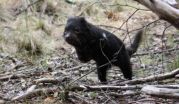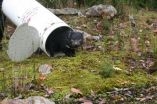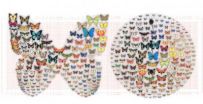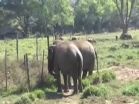(Press-News.org) Tasmanian Devil Facial Tumour Disease (DFTD) has ravaged the world's largest carnivorous marsupial since it emerged in 1996, resulting in a population decline of over 90%. Conservation work to defeat the disease has including removing infected individuals from the population and new research in Evolutionary Applications explains how this gives us a unique opportunity to understand how human selection alters the evolution of cancerous cells.
DFTD is an asexually reproducing clonal cell line, which during the last 16 years has been exposed to negative effects as infected devils, approximately 33% of the population, have been removed from one site, the Forestier Peninsula, in Tasmania between 2006 and 2010.
However, this parasitical disease has been able survive and counteract the effect of deleterious mutation, genomic instability as well as being able to infect more than 100,000 devils.
"In this study, we focus on the evolutionary response of DFTD to a disease suppression trial," said Beata Ujvari, from the, The University of Sydney. "Tumours collected from devils subjected to the removal programme showed accelerated temporal evolution of tetraploidy compared with tumours from other populations where no increase of tetraploid tumours were observed."
The disease eradication trial provides a unique opportunity to discover the long-term effects of human selection on DFTD evolution and to explore this, the team collected tumour tissue samples between 2006 and 2011 at 11 sites within the DFTD affected areas of Tasmania.
"Our study clearly demonstrates that DFTD tumours are able to rapidly respond to increased selection and adapt to a selective regime," said Ujvari. "The results suggest that ploidization may offer yet another pathway to which DFTD is able to adapt to the ever-changing evolutionary landscape sculptured by the devils' immune system. Our study is the first to show that anthropogenic selection may enhance cancer evolution in the wild, and it therefore cautions about what measures we employ to try to halt the spread of this devastating disease."
INFORMATION: END
Infected Tasmanian devils reveal how cancer cells evolve in response to humans
2014-02-18
ELSE PRESS RELEASES FROM THIS DATE:
Computer arranges pictures based on their artistic aspects
2014-02-18
This news release is available in German.
Until now, it has been a time-consuming process for a program to arrange pictures in a consistent order. It is even more complex to order them on the basis of visual characteristics. Computer scientists from Saarbrücken have developed a system to arrange pictures into a consistent order. It requires no more than a small number of pre-sorted example pictures. Operators of online portals or museums could use this technique, for example, to arrange complex datasets.
So far, if a nature photographer wanted to arrange pictures ...
Scientists chip away at the mystery of what lives in our mouths
2014-02-18
COLUMBUS, Ohio – Scientists have pieced together sections of DNA from 12 individual cells to sequence the genome of a bacterium known to live in healthy human mouths.
With this new data about a part of the body considered "biological dark matter," the researchers were able to reinforce a theory that genes in a closely related bacterium could be culprits in its ability to cause severe gum disease.
Why the dark matter reference? More than 60 percent of bacteria in the human mouth refuse to grow in a laboratory dish, meaning they have never been classified, named or studied. ...
ASU professor explores the ethics of scientific research and why they matter
2014-02-18
CHICAGO — Discovery and innovation are important to science, but how are they connected to each other, and how can they be fostered to benefit the wider public? Jason Robert, the Lincoln Chair in Ethics and Dean's Distinguished Professor of Life Sciences at Arizona State University discussed that question today (Feb. 16) at the annual meeting of the American Association for the Advancement of Science in Chicago.
"While most of the people at the AAAS meeting are presenting their research results, we're asking scientists to think harder about what they're doing in their ...
Malaria vaccine development paves way for protective therapy
2014-02-18
Scientists have made a significant contribution towards the development of a vaccine to prevent malaria.
Researchers have tested a preliminary form of a vaccine against the disease, which is spread by the bite of the mosquito and kills more than 600,000 people each year.
Until now, developing malaria vaccines has been challenging. A vaccine must incorporate key proteins from the malaria parasites, which will trigger production of antibodies by the immune system. These proteins have a complex, intricate structure that is hard to reproduce.
Scientists at the University ...
Northwestern Medicine researchers discover new way to prevent some strokes
2014-02-18
CHICAGO – Larry Ambrose woke up one night, wandered into his kitchen but couldn't completely read the time on his microwave. A few days later when he noticed his blood pressure was unusually high, he went to the hospital and was diagnosed as having a stroke. Ambrose, like 25 percent of all stroke patients, experienced a cryptogenic stroke, meaning despite numerous tests, physicians were unable to determine a cause.
"There were no warning signs and I felt there was nothing I could do to stop it from happening again," said Ambrose, who is 75 years old. "It's a scary feeling."
For ...
Case Western Reserve University
2014-02-18
Many mothers with children on life-sustaining medical devices, such as ventilators and breathing or feeding tubes, suffer physical and psychological distress from the stress of juggling treatments, appointments, therapies and daily family pressures.
But researchers from the Case Western Reserve University nursing school found that an intervention, called "Resourcefulness," which teaches moms how to better cope, bolsters the mother's wellbeing and, in turn, benefits the whole family.
Findings from a small pilot study of 22 mothers, "Resourcefulness training intervention: ...
Crowdsourced testers prefer new cyber search method
2014-02-18
Computer scientists at Case Western Reserve University have developed a new tool to search and fetch electronic files that saves users time by more quickly identifying and retrieving the most relevant information on their computers and hand-held devices.
Anonymous testers recruited through crowdsourcing preferred the new search tool nearly two-to-one over a keyword-based lookup interface and the most commonly available lookup search interface using Google.
Side-by-side comparisons showed the scientists' Conjunctive Exploratory Navigation Interface (CENI), which combines ...
New technology from CWRU links patient records between hospitals, medical flight crews
2014-02-18
Although trauma, heart and stroke patients benefit from being transferred from a local hospital to a higher-level care facility, it's unclear why patients transferred with non-urgent medical conditions show at least a 30 percent higher death rate than had they stayed put, according to researchers from Case Western Reserve University's nursing school.
"We think the answer is somewhere in the medical records," said Andrew Reimer, PhD, RN, KL2 Scholar instructor at the Dorothy Ebersbach Academic Center for Flight Nursing at Case Western Reserve University's Frances Payne ...
Something's wrong in Washington: Is American democracy in crisis?
2014-02-18
The Federal shutdown may be the most striking evidence to support claims that America's political system is broken, but it is far from the only example. Writing in Governance, acclaimed political scientists Norman Ornstein and Jared Diamond explore if tribalism is at the heart of the problem, or if the U.S. is facing a far greater political crisis.
"The state of our overall political process as the most dysfunctional I have seen in over 44 years of watching Washington and American politics up close," writes Norman Ornstein, from the American Enterprise Institute. "If ...
Asian elephants reassure others in distress
2014-02-18
VIDEO:
Asian elephants console others who are in distress, using physical touches and vocalizations, finds a study to be published in the open-access journal PeerJ. The findings are the first empirical...
Click here for more information.
Asian elephants console others who are in distress, using physical touches and vocalizations, finds a study to be published in the open access journal PeerJ. The findings are the first empirical evidence of consolation in elephants, says ...



